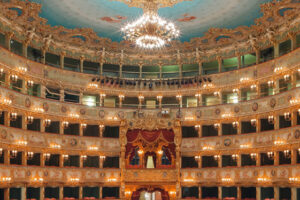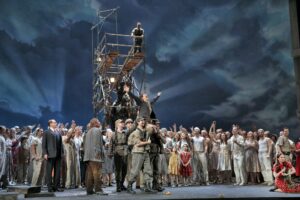

The excellence of the Strauss was no surprise, but Saturday night’s baroque fans were lucky to be treated to one of the best local Handel productions in years by this new and ambitious group, led by conductor Jennifer Peterson.
One doesn’t want to over-sell the show (of which two more performances remain): there was no set, no costumes other than evening dresses for the ladies and suits or jackets for the men, but I’ve rarely attended a local show with such integrity and one that radiated a stirring belief in the work’s musical worth, while Jeff Caldwell’s tastefully restrained production always trusted the beautifully-coached performers to embody their characters with a minimum of directorial intervention—one got the essence of Handel’s (and Feustking’s) Almira—nothing more, and certainly nothing less.
Hoping to escape a law career being forced upon him by his father along with a church gig he’d grown bored with, the eighteen-year-old Georg Friedrich Händel fled to Hamburg getting a job playing second violin at the Gänsemarkt Opera, by then one of Europe’s leading houses and one that didn’t rely on royal patronage but was supported by its middle-class audience. Encouraged by his friend Telemann, Handel soon was playing harpsichord as well and caught the notice of the theater’s manager, prolific opera composer Reinhard Keiser, who commissioned a first opera from Handel: Der in Krohnen erlangte Glücks-Wechsel, oder Alimira, Königin von Castilien which premiered in early 1705.
Almira’s very successful run of over 20 performances led to a second opera just six weeks later: Die durch Blut und Mord erlangete Liebe usually known as Nero. No other operas by Handel arrived before his departure for Italy in 1707 although two premiered after he left: Der beglückte Florindo and Die verwandelte Daphne in 1708. Of the four, only Almira has survived.
Those familiar with Handel’s later operas might not immediately recognize Almira; for one thing, most of the opera is in German–but not all of it. Often characters who have been conversing in German launch into an aria in Italian or a character singing an accompanied recitative in German will follow it with an Italian aria—it really keeps one off-balance. German opera of the time was an uneasy synthesis of the simpler style of German aria, the more elaborate Italian aria (usually in a da capo form) and French dance music: Almira includes many dance numbers, particularly for the coronation scene in act 1 and the pageant of the nations in act 3; these dances remain the opera’s most famous calling-card. Even those unfamiliar with 18th century vocal music will know the stunning piano transcriptions made by Franz Liszt of a sarabande and a chaconne:
Almira is a typical German opera of its time, including an astonishing 49 arias, though many are quite short, often accompanied by basso continuo only, and in a modified da capo form where the A repeat is left to the orchestra only rather to than the singer. His next extant opera–1707’s Rodrigo–demonstrates that an absolute sea-change occurred after Handel arrived in Italy earlier that year. And by 1709 at age 24 Handel had written for Venice his first unarguable masterpiece, the wickedly funny, unexpectedly moving Agrippina. But the uneven Almira does contain some gems, including an aria for the title character with a sublime oboe obbligato:
While Italian, French and English baroque opera are flourishing today, German works continue to be rare. I missed New York City Opera’s recent production of Telemann’s Orpheus oder Die underbare Beständigkeit der Liebe (yes they do all seem to have extraordinarily long titles!), but it was received with ambivalence by many, although René Jacobs’s recording of “Orpheus” reveals a fine opera. However, I prefer Telemann’s 1704 Germanicus
(contemporaneous with Almira) and especially his splendid Der Geduldige Sokrates (which I saw at the Berlin Staatsoper conducted by Jacobs in 2007) to his Orpheus. One hopes rumors of a CD or DVD of the Jacobs Sokrates are true; in the meantime, Flavius Bertaridus, König der Langobarden arrives next month
with Miriways also on the horizon.
Handel’s other Gänsemarkt colleagues haven’t been as lucky as Telemann, although Jacobs has also done Keiser’s Croesus, yet no operas of Johann Mattheson have been recorded (other than some excerpts
of his setting of Cleopatra.
Based on hearing a live recording of his Boris Goudenow, the lack of a complete Mattheseon is unfortunate, but Mattheson (who also sang as a tenor) remains destined to be best remembered for having fought a duel with Handel. Mattheson’s habit was to return to play in the orchestra after he had finished singing, but at one performance Handel was supposedly reluctant to give up his place at harpsichord, so an eventually harmless duel transpired right outside the opera house. But neither Mattheson nor Handel bore a wound nor a grudge as Mattheson sang the leading role of Fernando at Almira’s premiere less than a month later.
A glance at Almira’s checkered performance history (helpfully included in the operamisson program) reveals a surprising international disinterest: Although notable for being the only Handel opera performed anywhere during the 19th century, Almira had never been given outside of Germany until a truncated version was staged at the 2004 Amherst Early Music Festival. It has yet to be performed in England (usually home to all things Handelian) or France. Even operas by his Hamburg boss Keiser have fared better: Croesus was produced by both Opera North in England and by the Minnesota Opera during the past decade. And his delightful Der Lächerliche Prinz Jodelet had a smashing revival in Hamburg in 2004.
Operamission was clearly tackling something important Saturday night by presenting Almira’s uncut US stage premiere (which ran a bit over four hours), but I didn’t arrive with high hopes based on CPO’s rather drippy 1994 recording by Andrew Lawrence-King and Fiori Musicali.
However, Peterson assembled eight exceptionally well-prepared singers who made a strong case for Handel’s maiden effort. Friedrich Christian Feustking’s libretto–an adaptation of late 17th century Italian libretto by Giulio Pancieri–revolves around many convoluted encounters among three pairs of royal lovers who eventually find their way back into the right configuration by the curtain. There must, of course, be a lieto fine, but this one involves a particularly absurd last-minute revelation of a long-lost prince rescued as a child by a fisherman! Added to the mix of the six lovers are the older Prince Consalvo, Almira’s guardian, and Tabarco, her lover Fernando’s servant, the only comic character that I can think of in Handel until Elviro turns up in his penultimate opera Serse.
Happily, Karim Sulayman’s Tabarco was one of the evening’s highlights; no aging, nearly voiceless character-tenor, Sulayman combined a richly agile voice with a loose-limbed comic flair that never threatened to go over the top. As his handsome master Fernando, the Queen’s lovelorn secretary who is always being discovered in deceptively compromising situations, Michael Weyandt brought a lovely virile baritone to a role originally written for a low tenor, a casting decision which paid off as his voice effectively contrasted with the two tenors and two basses. Keith Jameson, who recently shone as the Novice in the MET’s Billy Budd, revealed a surprisingly accomplished florid technique while fussing and fuming amusingly as Osman, the “long-lost” Fernando’s brother.
As Prince Consalvo, bass Mark Risinger was properly stentorian but a bit too gravely for my taste; David Kravitz arrived only in act 2 in the shorter bass role of Raymondo but was gifted with one of the score’s real beauties: a touching third act aria “Zweier Augen Majestät” which he sang tenderly. He also handled the coloratura a bit more deftly than Risinger.
As the spitfire Edilia Nell Snaidas gamely tackled the role’s extravagantly demanding challenges; however, a less aggressive, more accurate approach would have been more rewarding. She did do fine job with her entrance aria “Schönste Rosen.” the opera’s best-known vocal number. Soprano Kristen Plumley as Bellante had less to do but sang well. In the title role, soprano Christy Lombardozzi started slowly, failing to properly gauge the extremely live acoustic of the room, sounding over-bright, even harsh.
During the evening’s second half, she settled into both the space and the character, whose music in acts 2 and 3 contains several of the more forward-looking numbers. Like some of Edilia’s music, Almira’s often rises to high Cs, yet Lombardozzi in her great vengeance aria “Kochet ihr adern entzündete Rache” confidently handled those while adding ornaments taking her even higher. In fact, all the ornamentation throughout the evening was beautifully done, stylish and grateful to the singer and the character.
One of the evening’s pleasures was the large (21 strong), young and hard-working period orchestra (including numerous alumni of the newish Juilliard Historical Performance program), particularly in the lush numbers for orchestra alone. Yet it must be said that many entrances were shaky, and the band sounded like it could have done with another week’s rehearsal, and the fatigue of the long performance seemed to tell more on the orchestra than on the singers, but I suspect the two remaining performances will be more confident.
For those outside the New York area wishing a sampling of Handel’s first opera, Akademie für Alte Musik has released a superb sampler of orchestral music from the Gänsemarkt, including a suite from Almira.
The biennial Boston Early Music Festival has regularly presented important US premieres of German baroque operas, including with Conradi’s Die schöne und getreue Ariadne in 2003 (which it recorded beautifully for CPO with Karina Gauvin in the title role) and Mattheson’s Boris Goudenow, in 2005, and had scheduled another, Graupner’s Antiochus und Stratonica, first for 2009 and then again for next year. However, the Graupner has once more been postponed, and BEMF has announced Almira for its 2013 festival centerpiece.
The festival will no doubt produce it on a lavish scale, but I think it will have to work very hard to surpass the passionate world of the Castilian queen created in a hotel lobby Saturday night by Peterson and her talented collaborators. I’m eager to see what operamission decides to tackle next!
Illustration by Tomi Um.

























Comments